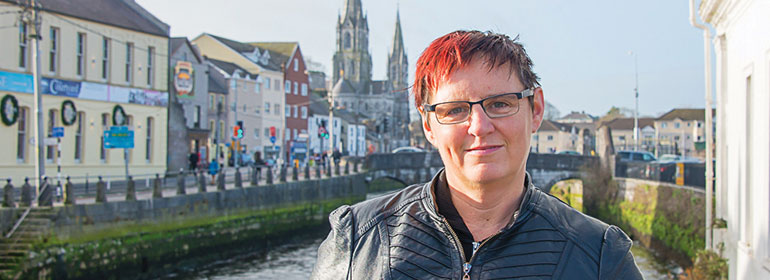Orla Egan has been actively involved with Cork’s LGBT community since the 1980s, and has published and presented papers on Cork’s LGBT history in various forums. She is currently developing the Cork LGBT Archive to gather, preserve and share information on Cork’s queer history. Her book, Queer Republic of Cork, has just been published with funding from Cork City Council. Photo by Jessica Jones.
There’s a rich history of LGBT activism and community development in Cork, but it’s not something you’d read about in the mainstream history books. The publications that are starting to come out in terms of Irish LGBT history tend to be very Dublin-centric. I wanted to add to our knowledge by writing a book about the queer history in Cork.
I was very much motivated by the Arthur Leahy collection. Arthur has been involved in queer politics in Cork for decades and he has an archival collection that he’s gathered since the 1970s, which he stored in the basement of his house. He agreed to let me access that, to organise and share it. I got funding from the heritage council to buy storage boxes for the collection, which motivated me to apply for a Cork City Council grant to write a book. I think their funding is really symbolic in terms of acknowledging LGBT history as part of Cork’s heritage and of Ireland’s heritage.
All the funds from the book go back into the archive, which is now residing in UCC on a week-to-week basis. The book is available to buy online, but I’d love for people to encourage their local bookshops to stock it. It would be great to see it in bookshops across the country.
Cork First
Many of the firsts of Irish LGBT activism happened in Cork. We had the first LGBT conference, the first LGBT film festival, the first float in a St Patrick’s Day parade, the first AIDS leaflet.
There was a lot of mutual support going on too, interconnection between the LGBT community and other social change movements. Places like Quay Co-op and Loafers were hubs not just for queer activism, but also for left-wing social change movements.
I found really positive stories from the 1970s, a time when you could have seen Cork as a really negative place to be queer, of people being hugely innovative, creating events and situations where they could socialise with one another. Even out of clandestine sexual encounters came a community, with bonds developing between the men that were involved in that, which led to lifelong friendships.
Strong Community
By the ’80s, Cork was a real hive of community activism. The Cork lesbian community always had really strong links with groups around the country, in places like Belfast and Galway, through things like Co-Operating North exchanges, where you’d have busloads of people coming down from Belfast for the Women’s Fun Weekend, or you had the Irish Women’s Camp bringing people together around the country. There were a lot of structures there.
There seems to be a perception that the campaign to win the marriage referendum in 2015 almost happened out of the blue, but it was built on decades of activism, on years of LGBT people demanding respect and equality.
The marriage equality campaign was very much a countrywide effort, but the narrative we’re forging is very much around high-profile individuals in Dublin. Those people played a very important role and I’m not putting anyone down, but we need to expand the story.
I’ve always felt that Cork has had much more of a community while Dublin has had a bigger a scene, but I think there’s much less community space than there was. There seems to be no need for queer cafés or queer bars anymore, and I think that’s a real absence.
Socialising Vs Activism
A lot of young people who are coming out don’t get the same connection with the community and with activism as I did in my day. It’s more about socialising now and less about community engagement.
My own most memorable community activism experience was in 1992, when we organised the first Irish LGBT float in a St Patrick’s Day parade. I think it happened because of a cross-pollination of ideas from the States into Cork.
You had a lot of Cork people living there who would then come back for things like the annual Women’s Fun Weekend, so here was a lot of awareness of what was going on in New York with the parade, and a drive to show how crazy that was by marching in Cork. I wrote in GCN the month afterwards, saying “we made history, and we did it in style”.
Orla Egan’s ‘Queer Republic of Cork: Cork’s Lesbian, Gay, Bisexual & Transgender Communities 1970s-1990s’ is available at www.onstream.ie for €11.99. Find out more about the Cork LGBT Archive at corklgbtarchive.com
© 2017 GCN (Gay Community News). All rights reserved.

comments. Please sign in to comment.